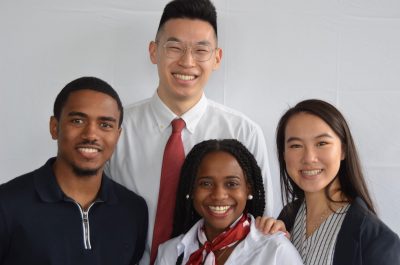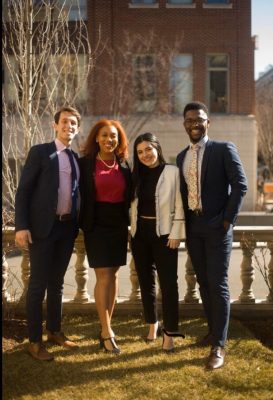Campaign season for Boston University’s Student Government began Monday, with a record-breaking five slates running for positions in the 2020-2021 academic year. Formal elections will take place from March 23 to March 30.
The slates are BeLoudBU, ConnectBU, IgniteBU, OneBU and 4BU with contenders for the positions of president, executive vice president, vice president of finance and vice president of internal affairs on each slate.
Hafzat Akanni, the current president of SG and a senior in the College of Arts and Sciences and the Frederick S. Pardee School of Global Studies, said students can also vote for the e-board of their college at this time. She added that it’s important to vote because the following e-board is only as strong as the one before it.
“If the executive board this year’s not great, chances are the executive board the year after that could be better, but they will probably have to fix whatever didn’t go well,” Akanni said. “If you have good people in office — which we should because you are voting for them — the idea is that student government and the student body as a whole will get better.”
Daniel Daponte, a Student Election Commission co-chair and sophomore in CAS, said any slates that apply, assuming all members are in good standing, are put on the ballot. He also said the committee was “pleasantly surprised” five slates made the ballot.
Here’s a look at the broad goals of the slates, according to each of their presidential candidates.
The BeLoudBU slate runners are Archelle Thelemaque, Josh Pei, Derrick Lottie and Sum Yue Guan.

Thelemaque, presidential candidate and a junior in College of Communication and CAS, said BeLoudBU is based on a want for students to “amplify BU students voices” with the pillars of “create,” “celebrate” and “collaborate.”
Thelemaque added that some of the plans the group has for the student body include allowing students to have their chosen name on their BU ID and decreasing laundry pricing, but she stressed that these are not the slate’s only goals.
“We want to amplify [these issues] and make them the most prevalent while we’re campaigning,” Thelemaque said. “But that’s not to say that there aren’t other things that we want to work on.”
The ConnectBU slate runners are Aditya Jain, Soumya Malhotra, Mariafernanda Hernandez and Hessann Farooqi.

Jain, a junior in the College of Engineering and presidential candidate, said the slate’s platform is based on unifying the community, which they plan to do by introducing “cross-college games” with challenges from sports to painting for BU delegates in each college to compete. He added that they hope to decrease the cost of the MBTA Semester Pass for students and widen the scope of Student Health Services by providing weekend service and more therapeutic resources.
“Our platform is about building community first and leveraging this 18,000-strong community to catapult real policy change,” Jain said. “And that really means like completely changing the way student government works today.”
Jain also said ConnectBU has the ability to carry out their promises to the community because each member has been involved in student government for a number of years.
“I think that our slate is coming in with a really unique understanding of student government. I myself have been in student government for three years now,” Jain said. “And I think that’s something that’s really visible in all members of our slate. We’re really a team of doers, and we’ve done the things to back up our big talk.”

The IgniteBU slate runners are Collin McCormick, Juliana Torrez-Ortiz, Kevin Yu Shi and Noor Siddiqui.
McCormick, a junior in CAS and Pardee and a presidential candidate, said IgniteBU’s platform pillars are student life, health — academic, financial, mental and physical — and unity.
He said his slate aims to improve transportation by updating the BU shuttle app and having the MBTA Green Line free for BU students. McCormick also said they want to create a committee that will launch an investigation into the practices and reliability of SHS.
According to McCormick, IgniteBU is defined as “student-centric,” and the group is ready to make a change.
“We want to come into office day one and already have a motion instead of jumping into things,” McCormick said.
The OneBU slate runners are Oliver Pour, David Joseph, Megan De Armas and Nyah Jordan.

According to Pour, a sophomore in the College of General Studies and presidential candidate, the group’s platform highlights three sectors: community, health and professional development.
Pour said OneBU hopes to implement self-care Wednesdays, create a health blog, establish a diversity week and connect students to alumni while cultivating connections among BU students. He also said they would make themselves accessible to students by adding additional office hours and instituting a Sunday meeting space for students to come and share ideas or concerns.
Pour said his slate’s involvement throughout BU makes them the right choice for BU students, as they have a well-informed view of what students want.
“It’s the fact that we’re so involved in different aspects of the community and have ties in different places, [that we can represent BU],” Pour said. “Like the Howard Thurman Center, the BUild Lab, Hillel. We’re all in different schools. I think it’s important to know what the community wants and to hear the community before making actions and we believe that we can make those actions.”
The 4BU slate runners are Dan Kelly, Joanna Hsieh, Tiya Kothary and Santiago Arenas.
Kelly, a sophomore in CAS and presidential candidate, said 4BU’s platform is based on tangible changes, with the four pillars of mental health, sustainability, student voice and your everyday.
He also said that some of the group’s goals include making SAT and ACT scores optional for BU applicants, replacing paper towel dispensers with hand dryers campus wide and adding a student government senator position for an LGBTQ student, a transfer student and an international student.
Kelly said that making changes to the BU campus, however, is not the only priority of the group.
“A large part of our initiative is not to just implement policy, but to extend the platform,” Kelly said. “It’s giving that opportunity for the voices of the campus, the voices on our campus that are underrepresented, to have a say, in the decisions being made.”
There will be a Town Hall March 17 from 6 p.m. to 9 p.m. at the George Sherman Union, a debate March 20 from 6 p.m. to 8 p.m. in room 211 of CAS and votes can be cast on the Student Link between March 23 and March 30. SG will reveal the winning slate at their Announcement Dinner from 7 p.m. to 9 p.m. in the GSU Backcourt.
Elan Aiache Reynaud, a sophomore in the Questrom School of Business, said she will vote in the election and she thinks other students should too.
“[Voting] is a way that you can help make a small change,” Aiache Reynaud said. “Also, hopefully, by voting for a slate that shares my views, there can be certain changes around BU.”
Amir Williams, a junior in the Sargent College of Health and Rehabilitation Sciences, said he would like to see Student Government introduce added social events.
“I feel like there should be more events centered around, just not academics,” Williams said, “but fun events that should be happening on campus to really bring a sense of culture to the campus.”
Tariq Salha, a freshman in CAS, said having five slates brings a wide array of candidates.
“There’s more diversity in who you want to appoint,” Salha said.























































































































